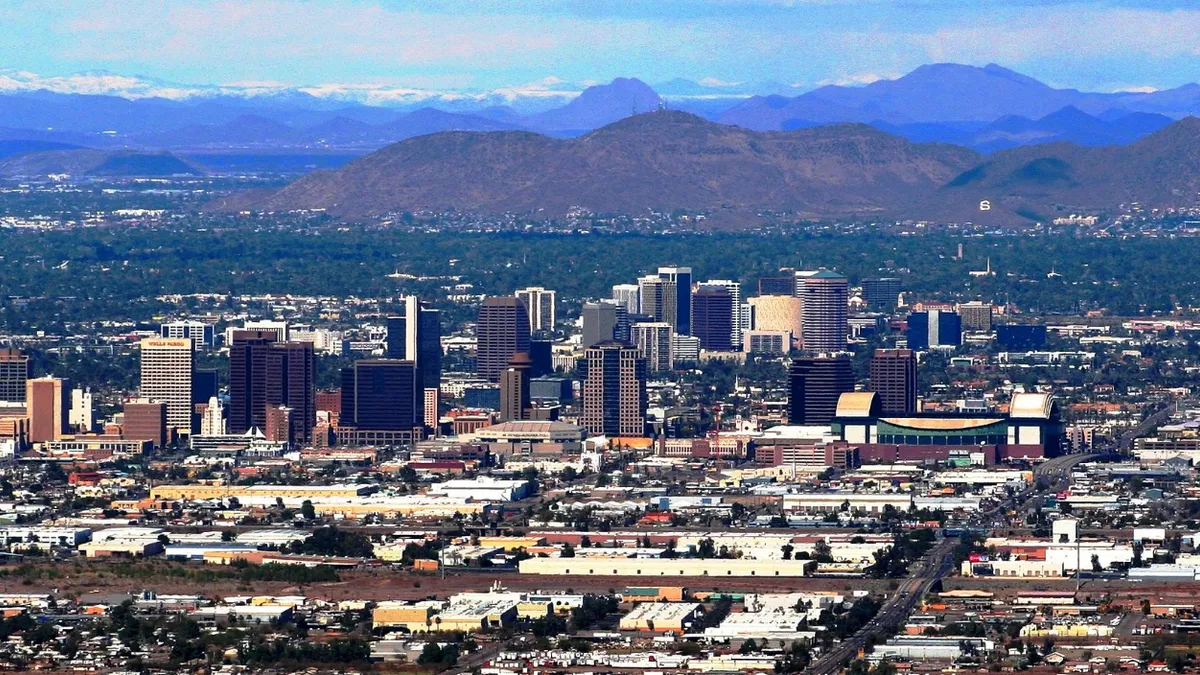Dive Brief:
- Arizona's top utility regulator, Bob Burns, put pressure on Arizona Public Service (APS) and its parent company, Pinnacle West, to cut political spending on Wednesday, hinting that inaction may impact the utility's next rate proceeding.
-
"I would suggest that if we do not receive that commitment from APS, maybe we need to change the way that we go about determining return on equity," Arizona Corportation Commission (ACC) Chairman Burns said during a hearing. "I think we would have the opportunity to do a little negotiation and have a settlement right then and there."
-
Incoming Pinnacle West CEO and current APS president Jeff Guldner testified on Wednesday before the commission and will return to testify before the commission in January about political spending, Burns told Utility Dive. Guldner could not commit to an initial request to cut such spending for the parent company.
Dive Insight:
Guldner discussed options for a follow-up hearing once he takes the helm at Pinnacle West, after Burns hinted that inaction would impact the utility's next rate proceeding.
"I believe we have the authority to use the ROE as a lever," Burns told Utility Dive, to authorize a rate increase "with the contingency being you get ROE 'X' if you do not participate in elections, and if you do participate, you get 'Y.'"
He believes the utility should not make any political contributions and individual employees should have limits on spending, as Arizona has "limits on most ... of our other elected contributions."
"That's something that [Guldner is] quite concerned about, which makes sense," Joe Smyth, research and communications manager of the think tank Energy and Policy Institute, told Utility Dive. Burns' implication poses a "threat to the company's prospects, in terms of ending political spending."
APS gave $10.7 million to three organizations involved in the 2014 ACC elections and $4.2 million to one organization participating in the 2016 ACC elections, according to the Energy and Policy Institute. Pinnacle West and APS spend over $10 million in Arizona's 2014 and 2016 elections, as shown below.
Political spending by APS and Pinnacle West in Arizona elections
| Political Campaigns | Political action committees (527 organizations) | Lobbying and advocacy (501(c)(3) and (4) groups) | Independent political expenditures | Total |
|---|---|---|---|---|
| 2013 | Not provided | $513,250 | Not provided | $513,250 |
| 2014 | $723,500 | $11,680,500 | $471,700 | $12,875,700 |
| 2015 | $290,000 | $1,332,500 | $48,550 | $1,671,050 |
| 2016 | $728,500 | $5,253,000 | $4,749,500 | $10,731,000 |
| 2017 | $155,500 | $900,000 | $4,357,500 | $5,413,000 |
| 2018 | $262,500 | $410,350 | $40,305,300 | $40,978,150 |
| Total | $2,160,000 | $20,089,600 | $49,932,550 | $72,182,150 |
SOURCE: Energy and Policy Institute, DATA: March APS subpoena response
Burns does not know whether the four other ACC commissioners support the use of the ROE as an influence tool when the utility seeks a rate hike.
"The correct move for the commission to make would be to write some rules, and I think we can," he said. "We should not have the perception that the utilities are buying the commission."
Arizona's commission is a co-equal fourth branch of the state's government, different from most states. As such, commissioners could address political spending through its rulemaking process. But that would take a long time and involve a lot of public input, Burns said, and so may not wrap up by the 2020 election. Burns is not seeking reelection in 2020, based on the state's term limits.
ACC rules do not forbid political spending by utilities, although several commissioners took issue with the perception of political influence during the Wednesday hearing.
Pinnacle West and APS could influence a number of regulatory proceedings that affect their business, Burns said.
The ACC is proceeding with an effort to redesign the utility business model, to consider electric retail competition — an effort APS is expected to oppose.
The amount of renewables that would be mandated in the state will continue to be a big issue in the next election cycle, Burns said. APS disclosed in April that Pinnacle West gave $39,675,000 to a political action committee opposing a 2018 ballot measure to increase the renewable energy mandate.
Pinnacle West chalked up the spending to a pro-business and sustainable energy focus.
"The policies set by our lawmakers and regulators have significant implications for our customers, employees and shareholders, and that is why we participate in the political process and advocate for pro-business policies that support a responsible and sustainable energy future for Arizona," Pinnacle West said in a statement. "We are fully transparent about our participation; in fact, we voluntarily go beyond what disclosure laws require by annually publishing a comprehensive list of our political contributions, funded by Pinnacle West shareholders – not APS customers."
Pinnacle West responded to a subpoena from Commissioner Sandra Kennedy in March affording more visibility into its political spending "than for almost any other utility," according to Smyth.
Burns has consistently criticized APS for rate hikes and political spending, although it is difficult to compare the spending efforts with utilities in other regions.
As not all states have elected commissions and there are several different types of political spending, it's difficult to do a "rock solid comparison" of APS' spending with other utilities, Smyth said. However, the spending the utility disclosed for 2014 was "clearly a new jump" in state political contributions.
"The spending in Arizona was pretty specific to the situation [in Arizona]. I'm not aware of anything that would have triggered any kind of broader national uptick in that year," Smyth said.
CORRECTION: A previous version of this article quoted an outdated estimate for Pinnacle West's spending to oppose a 2018 ballot initiative. The company gave $39,675,000 to a political action committee that lobbied against the measure.















